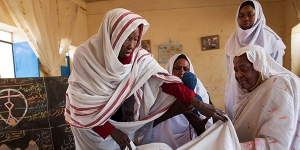The Power of Youth Working for Peace and Equality
The new U.N. Security Council Resolution 2250 on Youth, Peace and Security calls for organizations around the globe to involve young women and men more in peacebuilding. Join the U.S. Institute of Peace, Search for Common Ground and other partners on Sept. 13 for a Conflict Prevention and Resolution Forum including USAID Agency Youth Coordinator Michael McCabe. Speakers, including youth leaders, will discuss how young women and men are leading such work and what policymakers can do to ensure that the largest generation of youth the world has ever known is not left on the sidelines.
The U.N. resolution, adopted in December, identifies young people as critical partners for peace. It aims to counter a frequent narrative that defines young men as perpetrators of violence and young women as victims. In this discussion, policymakers, civil society organizations, and youth leaders will explore solutions that support youth leadership in peace and security efforts.

 Religion often is used to justify violence and the unequal status of women. More than ever, these problems are interrelated, and efforts that address them in isolation fail to produce comprehensive, long-term strategies.
Religion often is used to justify violence and the unequal status of women. More than ever, these problems are interrelated, and efforts that address them in isolation fail to produce comprehensive, long-term strategies.



